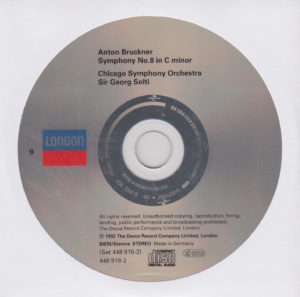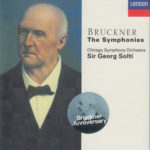 This morning’s conductor of Anton Bruckner’s Symphony No. 8 in C Minor (WAB 108), nicknamed “The Apocalyptic,” although I don’t know why, is
This morning’s conductor of Anton Bruckner’s Symphony No. 8 in C Minor (WAB 108), nicknamed “The Apocalyptic,” although I don’t know why, is
Hungarian-born Sir Georg Solti (1912-1997), an artist with a long and noteworthy career.
His orchestra for this box set is equally revered: the Chicago Symphony Orchestra.
I first heard Sir Georg Solti on Day 14 of my 144-day journey, Symphony No. 1.
Then again on Day 30, Symphony No. 2.
Then again Day 46, Symphony No. 3.
Then again on Day 62, Symphony No. 4.
Then again on Day 78, Symphony No. 5.
Then again on Day 94, Symphony No. 6.
Then again, most recently, on Day 110, Symphony No. 7.
In my previous assessments, I pointed out that there’s a lack of information in the CD book regarding the record label. Its name is nowhere to be found. Also, it’s not always complete regarding the versions or the editors (Nowak? Haas? Carrigan?)
 Okay, now on to the objective aspects of this recording:
Okay, now on to the objective aspects of this recording:
Bruckner’s Symphony No. 8 in C Minor (WAB 108), composed between 1884-1890
Sir Georg Solti conducts
Solti used the “1890 version, ed Nowak,” according to the CD booklet
Chicago Symphony Orchestra plays
The symphony clocks in at 68:36
This was recorded in November of 1990 in Leningrad, St. Petersburg
Solti was 78 when he conducted it
Bruckner was 66 when he finished composing it
This recording was released on the London/Decca label
Bruckner wrote his symphonies in four parts. The time breakdown from this particular symphony (Symphony No. 7 in E Major (WAB 107), from this particular conductor (Sir Georg Solti ) and this particular orchestra (Chicago Symphony Orchestra) is as follows:
I. Allegro moderato…………………………………………………………………………….21:27
II. Scherzo. Allegro moderato…………………………………………………………….25:12
II. Adagio. Feierlich langsam; aber nicht schleppend……………………….10:10
IV. Finale. Feierlich, nicht schnell……………………………………………………….11:45
Total running time: 68:36
From its entry on Wikipedia,
1890 Version
Some scholars such as Deryck Cooke and Robert Haas have suggested that the 1890 revision was the product of Bruckner’s insecurity and pressure from his colleagues such as Josef Schalk: Cooke even referred to it as the “Bruckner-Schalk revision”. Against this Leopold Nowak has pointed out that there is no evidence of any handwriting other than Bruckner’s own in the 1890 manuscript. According to the testimony of Bruckner’s friends and associates the composer was extremely resistant to outside interference.The scoring of the 1890 version is fuller and more grandiloquent than the 1887 version, with subtler textures and harmonies in the woodwind in particular, allowed for by the increased size of this section of the orchestra. It was published in 1955 in an edition edited by Leopold Nowak.
Okay when you put all this together, what do you get?
My Rating:
Recording quality: 5
Overall musicianship: 5
CD liner notes: 4 (lengthy essays, but incomplete recording/version information)
How does this make me feel: 5
As I’ve noted before, the Chicago Symphony Orchestra can, at times – at least, to my ears – sound a bit piercing in the horn section. That’s not the case in these recordings. Everything is kept just below the brassy level.
This performance is relative short (just 68:36), so it breezes right along. Before my ass has a chance to get tired, I’ve heard it through twice.
I like that.
There’s no need to drag out Bruckner’s Eighth for nearly 90 minutes. Get it. Get it done. Get out.
For that, alone, I give Sir Georg props.
Of course, given Sir Georg Solti’s reputation as being the conductor for what’s noted as “The Greatest Recording Of All Time!” (His interpretation of Richard Wagner’s Der Ring Des Nibelungen), I expected another fine job with a Bruckner symphony.
And I got it.
I got it. It was stirring.
The recording was well balanced and powerful in all the right places.
By the time the Finale got to the triumphant end, I was ready to jump to my feet and shout…
“Huzzah!”
